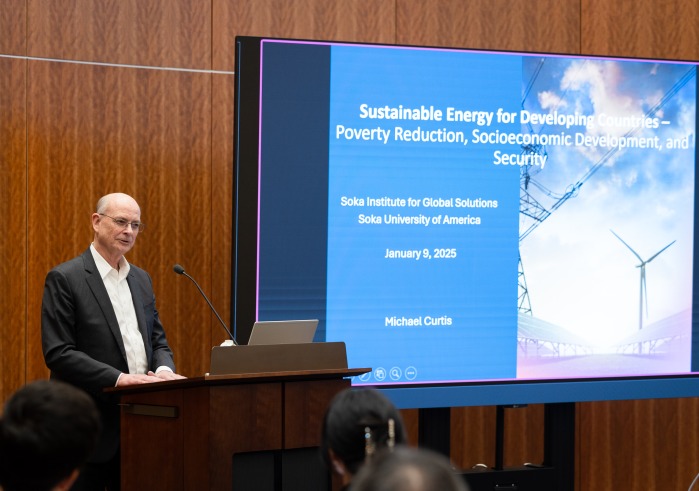Beyond Technology: The Human Side of Solving Energy Poverty

Liberal arts education is essential for addressing global energy poverty, as leaders in the field increasingly recognize that technical solutions alone aren’t enough. This was the core message from Dr. Michael Curtis, who recently retired from the U.S. Agency for International Development (USAID), in his Jan. 9 talk to the SUA community.
“There are 1.18 billion people who are suffering from energy poverty,” said Curtis, citing a 2024 World Bank report. “We’ve got the technology. That’s the easy part. The hard part involves experts who understand the interrelatedness of human development and the environment.”
Curtis’s lecture, part of the Sustainability Panel Series hosted by the Soka Institute for Global Solutions, drew on his experience leading energy programs for USAID in Moldova, Pakistan, and various Central Asian and sub-Saharan African countries.
Energy poverty impacts the environment, public health, and social issues like gender inequality. In areas without access to electricity, people often rely on burning wood for heat and cooking, which contributes to deforestation and air pollution. In addition, women and girls are usually expected to gather firewood or other burnable fuel, a time-consuming task that prevents them from attending school. Women and girls in these communities often cook for their households over an indoor fire, frequently leading to respiratory illnesses.
People living with energy poverty, Curtis explained, do not necessarily live in places without electrical infrastructure. Many people in developing countries simply cannot afford to connect their homes to the existing electrical grid. In countries where this is common, he elaborated, many households connect illegally to the power grid, and the system suffers unsustainable losses in revenue. Frequent rolling blackouts are another contributor to energy poverty in the developing world. These conditions, Curtis said, put societies at risk of social unrest.
“There are no easy solutions here,” Curtis said. “The challenges are intractable and will require a long-term perspective and a lot of effort to establish sustainable and successful outcomes. But at the same time, even small changes that can be realized in the near term can help improve the lives of millions of people … Our small contributions can make huge differences to those who need it the most.”
He used the specific example of Moldova, where he worked most recently, as a way to illustrate how political will, reliable institutions, and human capabilities all play essential roles in effecting change toward secure and sustainable energy. Situated between Romania and Ukraine, Moldova receives most of its electricity from one power plant in Transnistria, a region along the eastern border. The power plant runs on gas provided by a Russian-owned company via a pipeline that runs through Ukraine. Since the Russian invasion of Ukraine in 2022, the Russian-owned gas company has frequently shut off the pipeline, leaving 70% of Moldovans without power and halting production in the country’s steel, cement, and textile industries.
In the short term, the United States has provided Moldova with a grant to help them pay for extremely expensive electricity imports from neighboring Romania. The Moldovan government has started a campaign to encourage people to conserve energy. And two new transmission lines, designed to bring more electricity from Romania, are already under construction.
However, Transnistria is still without electricity, and the situation is politically complicated. The current president of Moldova, Maia Sandu, is in favor of joining the European Union, while the regional political leaders in Transnistria are aligned with the Kremlin. These leaders therefore refused the Moldovan federal government’s offer to import gas from Europe to reopen the Transnistrian power plant. In the meantime, the people of Transnistria are facing a bitterly cold winter without power, leaving the poorest populations especially vulnerable.
In the long term, Curtis argued, Moldova needs to generate its own energy in order to increase its energy security and promote sustainable development. Moldova’s strong winds have enormous potential for renewable wind energy if the country is able to harness private investments and build up the capacity of its government institutions. The latter presents a special challenge, as much of the young, educated workforce of Moldova has left the country to pursue economic opportunities elsewhere. Moldova will need to incentivize these skilled workers to return and fill the planning and analysis jobs that will make a clean and secure energy future possible.
The Moldova case, Curtis stressed, exemplifies why addressing energy poverty around the world requires an interdisciplinary, humanistic approach — precisely the skill set that liberal arts students develop over the course of their education at SUA.
“It takes all the disciplines that you study today: humanities, social sciences, business, economics, psychology, health, education, physical sciences, engineering, and more. It takes a very multidisciplinary approach,” Curtis said. “Regardless of your field of study, there is a place for you in addressing these kinds of problems.”
